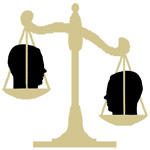 We cannot understand the self by examining people in isolation. Too many important aspects of personhood only appear in a social context.
We cannot understand the self by examining people in isolation. Too many important aspects of personhood only appear in a social context.
Thomas Metzinger’s work describes the self-model in which our ideas about ourselves are rooted. The model is (usually) transparent, in that we operate through it without (usually) any awareness of a distinction between the model and the underlying reality. It is a model to which we have a profound emotional attachment—most of us care, deeply, about ourselves in the past, present, and future. As a result, our self-models are motivational. They spur and shape our actions. We evaluate possible courses of action by putting our self-models through various simulations, and responding emotionally to the different outcomes we imagine. The research of Antonio Damasio has begun to show how our emotions must inform our executive decision-making processes in order for us to make what are commonly recognized as ‘rational’ decisions.
Most of what Metzinger and Damasio have to say about the self is as true of isolated individuals as of human beings immersed in society. But a case can be made that the concept of the self could only have emerged in a social context. I have argued that our concepts, particularly the entities recognized by our ontology, reflect what is important to us. The spatio-temporal boundaries between ‘things’ are artificial, not natural; they do not exist in nature, but are imposed upon nature by human beings. A person is an entity whose boundaries roughly coincide with those of a human biological organism. A person is commonly considered to begin sometime around birth; sooner in some traditions, later in others. The person is usually thought to persist until biological death; but many people believe that it continues much longer than that; and some believe that if the organism is sufficiently damaged, then the person may cease to exist before its organism dies.
Among other things, a person is a unit of moral and legal responsibility—a bearer of enduring rights and privileges, duties and obligations, merits and demerits, assets and liabilities, debts and credits. Those attributes of individual persons result from, and depend on, the fact that individuals are members of a larger society. If a human being is isolated for a long time from other human beings, legal obligation disappears from his life, and moral obligation, if it does not entirely disappear, is vastly curtailed. I would not go so far as to say that an isolated human being ceases to be a person; only that certain central and important aspects of personhood simply disappear from his or her life. Having moral and legal rights and obligations is a central and important aspect of personhood. Continue reading “Persons in Law”
